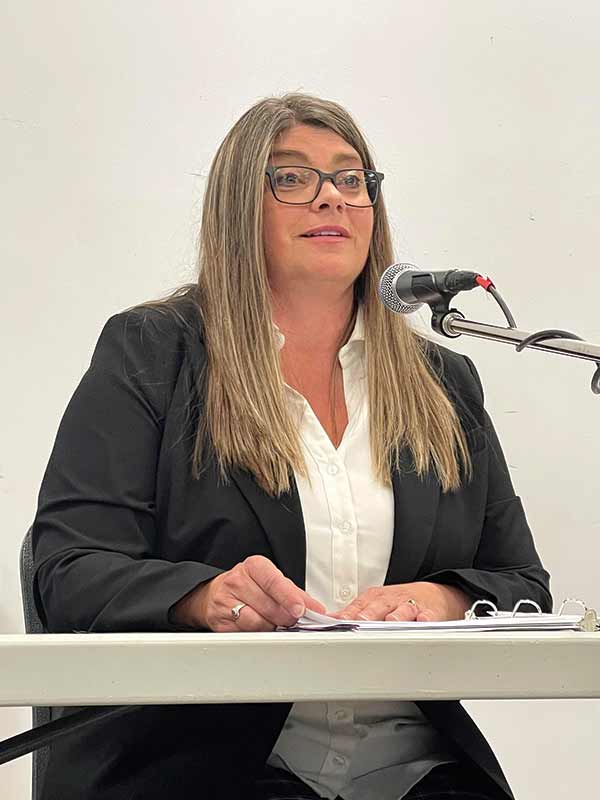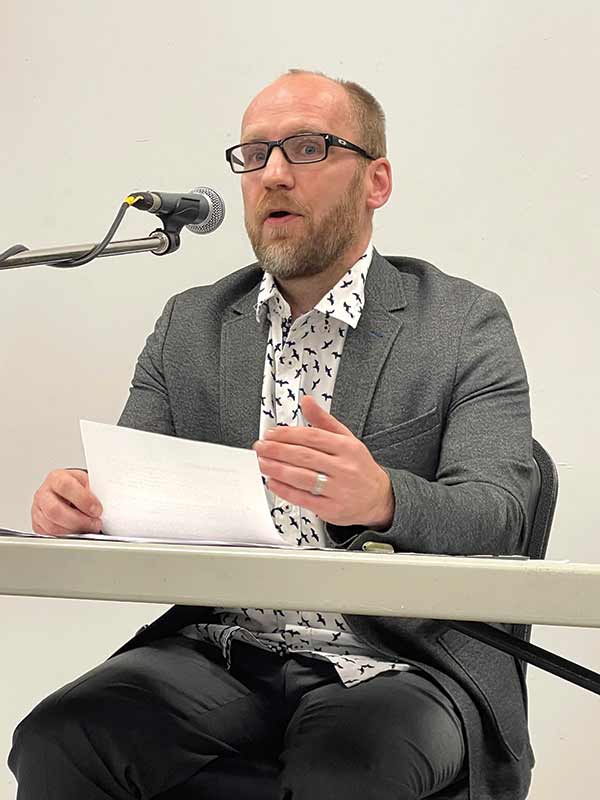Ahead of the provincial election on Oct. 3, the Winkler and Morden chambers of commerce hosted a candidates’ forum to give local voters an overview of the values and goals of the individuals running in Morden-Winkler.
A full house of listeners showed up for the Sept. 18 event, which took place at the Morden 55+ Activity Centre.
Sharing their views were New Democratic Party candidate Ken Friesen and Progressive Conservative Party candidate Carrie Hiebert. The Liberal’s Mattison Froese was not in attendance.
Friesen and Hiebert fielded questions from the crowd on a variety of topics.
In response to the question, “What would you do to create more affordable housing and how would you help attract workers to this area?” Friesen said, “In order to draw people to our community, we need to invest in healthcare and education, because those are the reasons people stay in the area.”
Hiebert noted that the PC government has created 700 new social housing units and implemented rent subsidies.
“We’re also working with different communities to give them funding and help them invest in those programs. We do have a shortage. It’s across the country, not just in our area. And it is important for us to work together, municipally, provincially, and federally and with our city councils to find out how to bring these costs down.”
To a question regarding strategies to recruit new doctors to the region, Hiebert said the PC government has filled 2,000 new healthcare positions this year, and pointed to their new $120 million healthcare recruitment fund, which includes rural recruitment funding.
“We have a beautiful hospital coming in, and we’re going to get that filled,” she said.
Friesen countered, “The NDP is going to reinstate the recruitment fund that Pallister cut. It was $4.5 million for rural recruitment specifically, and then they’re going to double it to $9 million. The NDP will have the largest recruitment campaign in Manitoba history, with 400 doctors, 300 nurses, 200 paramedics, and $500 million.”
Part of that process, he added, would be creating more incentives for doctors and nurses to work in rural Manitoba.
When asked how their government will rectify the poor state of Manitoba roads, both candidates agreed more work needs to be done.
Hiebert said the PCs are committed to a multi-year, $4.2 billion infrastructure strategy.
“Our plans include more than 800 capital projects planned in the next five years. We have winter, we have potholes. We’re getting them fixed as fast as we can.”
Friesen said everyone agrees that roads need to be improved, but that requires workers to do the job.
“Typically, many of the construction jobs are contracted to out-of-province companies. We need to not just invest in the roads, but also invest in Manitoba and the workers that are here, to ensure that any Manitoba infrastructure job is for Manitoba workers, so that we’re not only fixing our roads, but we’re also fixing our economy.”
The candidates were asked if they support the minimum wage policy, and the projected increases.
Friesen noted the minimum wage system as it’s presented right now is not enough.
“Minimum wage is too low. Nobody should live in poverty. Anyone working a full-time job should not be in poverty. There’s no way you can make ends meet on a minimum wage salary. The minimum wage should be the minimum required to actually have a life.”
Responding from the perspective of a business owner, Hiebert said that wages should also reflect the value of the work.
“A lot of our employees come in as their first job. I do believe we should have a good minimum wage. I do think if somebody comes in and does a good job, we want to pay them more because they’re more valuable to us. People do need to be rewarded for doing a good job.”
In terms of how each candidate would advocate for mental health supports in schools, Hiebert believes that parents and teachers need to work together for the needs of the child.
“We also need to work on mental health supports. I know that the PC government has added a lot to our supports, but we can always do a better job. Our kids have gone through a really hard time in the last few years and we need to come alongside them, work as a team and put the child first.”
Friesen, whose wife is a mental health clinician, says there are not enough of them in the province.
“One of the ways to support students so they’re not having that anxiety is to put a cap on class sizes. The cap is too high. Morden/Winkler has one of the worst teachers to student ratios in the province, which means the province is investing the least amount of money on our children in the schools. We need to hire more teachers, EAs and clinicians to help the schools catch up. Investing in education also means investing in our economy, because people come to communities where there is good education and good healthcare.”
Hiebert was asked to comment on the increased parental control her party is hoping to implement in public schools.
“There are four points,” she responded. “The right to be informed of the curriculum of your child in school, the right to be informed of situations of bullying or behavioural changes, the right to consent to any image before your child is shared, and the right to advance notice before any presentation is made by anybody who is outside the school.
“We have not addressed these rules for more than 30 years. In that time, we’ve seen the arrival of internet, social media, and online bullying. We’ve had a lot of things come into our communities and into our schools. We need to get parents to have a say as to what happens in schools and be notified of changes. Parents know what’s best for their kids and we need to go back to that.”
Friesen said it’s laughable that the party that wanted to pass Bill 64, which would take parental voices away from education and centralize it in Winnipeg, is now saying they want to give parents a voice.
“It’s a smoke and mirrors show here. All they’re telling you is what you want to hear, to get the vote. They may be updating a rule or a law, but they’re not making huge sweeping changes. The NDP stopped Bill 64, and we will stop it again and fight for local voices in education.”
To that, Hiebert countered that Premier Heather Stefanson did remove that bill.
“There’s no smoke and mirrors here,” she retorted. “We are consulting with schools and parents constantly.”
Each candidate was asked to explain their party’s position on gender identification in schools.
Friesen said the kids need to feel safe when they’re in school, however they’re identifying.
“But they’re not feeling safe at home. Forcing the teachers to go to parents and tell them what’s happening at school with gender identity is putting those kids at risk, because why are they not telling their parents? Why are they not having those conversations at home already? Is it because of the risk of violence? Is it because of the risk of being kicked out? The communication needs to happen with the family beforehand and have a relationship with your kids, before you expect the teacher to take away a safe place for them. If they don’t feel safe at home, and they don’t have a safe place at school, you’re making it dangerous for these people to exist.”
Hiebert noted, “I believe everybody has a choice and a responsibility to respect everybody around us. Parents are getting concerned that kids are being encouraged to be part of something or identify as something that would not be what the child normally would do on their own. It could also happen where the child doesn’t feel safe, and that definitely should be addressed. We should talk to a social worker. We should find them mental health support to help them talk to their parents.”
In closing, both candidates shared how they would address some of the biggest fiscal challenges in the riding.
Hiebert said, “Water and wastewater are a big problem. We’re growing so fast. The villages are expanding in every direction. The PC government has increased funding by $47 million, on top of what they already received. Municipalities received $116 million which is a 17 per cent increase since last year. Plus $147 million for water and infrastructure. We need to continue to grow.”
“The major fiscal problem is health care and education recruitment and retention,” Friesen stated. “We need those professionals to strengthen our communities. And in order to grow our economy, we need to invest in people and services that keep people here. Hope is not a strategy. We need to invest in services to grow and build in our community. The biggest challenge is keeping people in the area.”
Photos by Lori Penner/Voice
Morden-Winkler candidates Carrie Hiebert (left) and Ken Friesen (right) made their case for your vote at a forum in Morden last week.

